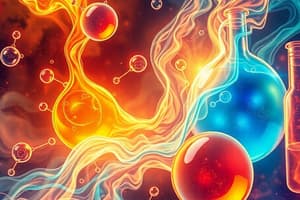Podcast
Questions and Answers
What are functional groups, and how do they influence the characteristics of organic compounds?
What are functional groups, and how do they influence the characteristics of organic compounds?
Functional groups are specific groups of atoms within molecules that determine the chemical properties and reactivity of organic compounds.
Explain the concept of isomerism with an example.
Explain the concept of isomerism with an example.
Isomerism refers to compounds that have the same molecular formula but different structural arrangements; for instance, glucose and fructose are structural isomers.
What distinguishes inorganic chemistry from organic chemistry?
What distinguishes inorganic chemistry from organic chemistry?
Inorganic chemistry primarily focuses on compounds that do not contain carbon-hydrogen bonds, whereas organic chemistry studies carbon-containing compounds.
What is thermodynamics in the context of physical chemistry?
What is thermodynamics in the context of physical chemistry?
Describe the role of quantitative analysis in analytical chemistry.
Describe the role of quantitative analysis in analytical chemistry.
What are macromolecules, and why are they important in biochemistry?
What are macromolecules, and why are they important in biochemistry?
What is coordination chemistry, and what is its significance?
What is coordination chemistry, and what is its significance?
How does spectroscopy contribute to analytical chemistry?
How does spectroscopy contribute to analytical chemistry?
Flashcards are hidden until you start studying
Study Notes
Organic Chemistry
- Definition: Study of carbon-containing compounds and their properties.
- Key Concepts:
- Functional Groups: Groups of atoms that determine the characteristics of organic compounds (e.g., alcohols, carboxylic acids).
- Isomerism: Compounds with the same molecular formula but different structures (e.g., structural, geometric, and optical isomers).
- Reactions: Common types include substitution, addition, elimination, and rearrangement.
- Synthesis: Development of new compounds using reactions and mechanisms.
Inorganic Chemistry
- Definition: Study of inorganic compounds, primarily those that do not contain carbon-hydrogen bonds.
- Key Concepts:
- Types of Compounds: Includes metals, minerals, and coordination compounds.
- Coordination Chemistry: Study of complex ions where a central metal atom is bonded to surrounding molecules or ions (ligands).
- Main Group Elements: Elements in groups 1, 2, and 13-18 with unique properties and reactivity patterns.
- Transition Metals: Elements in groups 3-12 known for their ability to form variable oxidation states and colored compounds.
Physical Chemistry
- Definition: Study of the physical properties and behavior of chemical systems.
- Key Concepts:
- Thermodynamics: Study of energy changes in chemical reactions (laws of thermodynamics).
- Kinetics: Rate of chemical reactions and the factors affecting them (e.g., concentration, temperature).
- Quantum Chemistry: Application of quantum mechanics to chemical systems, explaining electron behavior and bonding.
- Spectroscopy: Techniques for analyzing substances based on their interaction with electromagnetic radiation.
Analytical Chemistry
- Definition: Study of techniques and methods for analyzing substances to determine their composition.
- Key Concepts:
- Qualitative Analysis: Identifying the components of a substance.
- Quantitative Analysis: Determining the exact amount of a component in a mixture.
- Techniques: Include chromatography, mass spectrometry, and titration.
- Method Validation: Ensuring analytical methods are reliable and reproducible.
Biochemistry
- Definition: Study of chemical processes within and related to living organisms.
- Key Concepts:
- Macromolecules: Includes proteins, nucleic acids, carbohydrates, and lipids.
- Metabolism: Sum of all chemical reactions in a biological system, encompassing catabolism and anabolism.
- Enzyme Function: Biological catalysts that speed up reactions by lowering activation energy.
- Genetic Information: Role of nucleic acids (DNA and RNA) in heredity and protein synthesis.
Organic Chemistry
- Study focuses on carbon-containing compounds and their properties.
- Functional groups, such as alcohols and carboxylic acids, are critical as they shape the behavior and characteristics of organic substances.
- Isomerism involves compounds sharing the same molecular formula but differing in structure, including structural, geometric, and optical forms.
- Common chemical reactions include substitutions, additions, eliminations, and rearrangements that alter molecular structure.
- Synthesis in organic chemistry involves creating new compounds through various reactions and mechanisms.
Inorganic Chemistry
- Concentrates on inorganic compounds, mainly those lacking carbon-hydrogen bonds.
- Encompasses a variety of compounds, including metals, minerals, and coordination complexes.
- Coordination chemistry explores complex ions where a central metal atom is bonded to surrounding molecules or ions (ligands), which affect reactivity and properties.
- Main group elements (groups 1, 2, and 13-18) exhibit distinctive properties and reaction trends.
- Transition metals (groups 3-12) are noted for their variable oxidation states and colored compounds, impacting their chemical behavior.
Physical Chemistry
- Investigates physical properties and behaviors of chemical systems.
- Thermodynamics examines energy changes in reactions, governed by the laws of thermodynamics.
- Kinetics studies the rates of chemical reactions and factors influencing them, such as concentration and temperature.
- Quantum chemistry applies quantum mechanics to chemical systems, providing insight into electron dynamics and chemical bonding.
- Spectroscopy encompasses techniques to analyze substances based on their interaction with electromagnetic radiation, aiding in substance identification.
Analytical Chemistry
- Focuses on methods and techniques for analyzing substances to elucidate their composition.
- Qualitative analysis identifies the various components present in a substance.
- Quantitative analysis measures the exact quantities of components in a mixture.
- Techniques utilized include chromatography, mass spectrometry, and titration for effective analysis.
- Method validation ensures that analytical methods yield reliable and reproducible results, maintaining accuracy in findings.
Biochemistry
- Explores chemical processes in living organisms and their interactions.
- Macromolecules like proteins, nucleic acids, carbohydrates, and lipids serve essential roles in biological systems.
- Metabolism refers to the collective chemical reactions, including catabolic (breakdown) and anabolic (building) processes.
- Enzymes are biological catalysts that enhance reaction rates by lowering the activation energy required.
- Nucleic acids, including DNA and RNA, are pivotal in genetics and protein biosynthesis, facilitating heredity and cellular function.
Studying That Suits You
Use AI to generate personalized quizzes and flashcards to suit your learning preferences.




